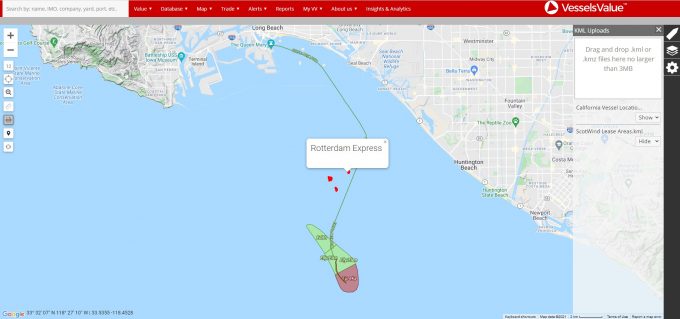Two winners from the Red Sea crisis: the shipping lines and Houthis
“Vessels ‘go dark’ to avoid Houthi attacks,” blared headlines as 2024 kicked in, and commercial ...
FDX: ABOUT USPS PRIVATISATIONFDX: CCO VIEWFDX: LOWER GUIDANCE FDX: DISRUPTING AIR FREIGHTFDX: FOCUS ON KEY VERTICALFDX: LTL OUTLOOKGXO: NEW LOW LINE: NEW LOW FDX: INDUSTRIAL WOESFDX: HEALTH CHECKFDX: TRADING UPDATEWMT: GREEN WOESFDX: FREIGHT BREAK-UPFDX: WAITING FOR THE SPINHON: BREAK-UP ALLUREDSV: BREACHING SUPPORTVW: BOLT-ON DEALAMZN: TOP PICK
FDX: ABOUT USPS PRIVATISATIONFDX: CCO VIEWFDX: LOWER GUIDANCE FDX: DISRUPTING AIR FREIGHTFDX: FOCUS ON KEY VERTICALFDX: LTL OUTLOOKGXO: NEW LOW LINE: NEW LOW FDX: INDUSTRIAL WOESFDX: HEALTH CHECKFDX: TRADING UPDATEWMT: GREEN WOESFDX: FREIGHT BREAK-UPFDX: WAITING FOR THE SPINHON: BREAK-UP ALLUREDSV: BREACHING SUPPORTVW: BOLT-ON DEALAMZN: TOP PICK

Historical tracking of vessels in the vicinity of the Amplify Energy Corporation’s southern California pipeline shows no vessel passed over it around the time of a leak.
An “uncontrolled leak of oil” occurred of the California coastline from a subsea pipeline was reported to the US Coast Guard on 2 October by the operator, Beta Offshore, a subsidiary of Amplify Energy.
Press speculation suggested a Hapag-Lloyd vessel, the Rotterdam Express, or a “mystery” other ship had dragged its anchor, displacing the pipe and leading to a crack and the oil spill.
However, evidence compiled by VesselsValue for The Loadstar reveals the closest vessels, including Rotterdam Express and a possible contender for the ‘mystery ship’, the TS Lines-owned TS Manila, never crossed the pipeline.
The focus of the investigation has now moved away from these vessels.

Vessel locations relative to the Amplify Energy oil pipeline. Courtesy of VesselsValue.
Comment on this article